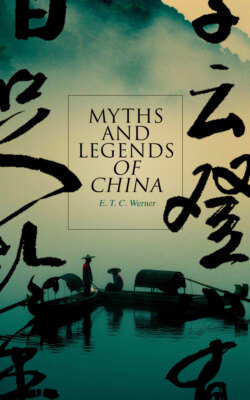Читать книгу Myths and Legends of China - E. T. C. Werner - Страница 23
На сайте Литреса книга снята с продажи.
Ecclesiastical Institutions
ОглавлениеThe dancing and chanting exorcists called wu were the first Chinese priests, with temples containing gods worshipped and sacrificed to, but there was no special sacerdotal class. Worship of Heaven could only be performed by the king or emperor. Ecclesiastical and political functions were not completely separated. The king was pontifex maximus, the nobles, statesmen, and civil and military officers acted as priests, the ranks being similar to those of the political hierarchy. Worship took place in the 'Hall of Light,' which was also a palace and audience and council chamber. Sacrifices were offered to Heaven, the hills and rivers, ancestors, and all the spirits. Dancing held a conspicuous place in worship. Idols are spoken of in the earliest times.
Of course, each religion, as it formed itself out of the original ancestor-worship, had its own sacred places, functionaries, observances, ceremonial. Thus, at the State worship of Heaven, Nature, etc., there were the 'Great,' 'Medium,' and 'Inferior' sacrifices, consisting of animals, silk, grain, jade, etc. Panegyrics were sung, and robes of appropriate colour worn. In spring, summer, autumn, and winter there were the seasonal sacrifices at the appropriate altars. Taoism and Buddhism had their temples, monasteries, priests, sacrifices, and ritual; and there were village and wayside temples and shrines to ancestors, the gods of thunder, rain, wind, grain, agriculture, and many others. Now encouraged, now tolerated, now persecuted, the ecclesiastical personnel and structure of Taoism and Buddhism survived into modern times, when we find complete schemes of ecclesiastical gradations of rank and authority grafted upon these two priestly hierarchies, and their temples, priests, etc., fulfilling generally, with worship of ancestors, State or official (Confucianism) and private or unofficial, and the observance of various annual festivals, such as 'All Souls' Day' for wandering and hungry ghosts, the spiritual needs of the people as the 'Three Religions' (San Chiao). The emperor, as high priest, took the responsibility for calamities, etc., making confession to Heaven and praying that as a punishment the evil be diverted from the people to his own person. Statesmen, nobles, and officials discharged, as already noted, priestly functions in connexion with the State religion in addition to their ordinary duties. As a rule, priests proper, frowned upon as non-producers, were recruited from the lower classes, were celibate, unintellectual, idle, and immoral. There was nothing, even in the elaborate ceremonies on special occasions in the Buddhist temples, which could be likened to what is known as 'public worship' and 'common prayer' in the West. Worship had for its sole object either the attainment of some good or the prevention of some evil.
Generally this represents the state of things under the Republican régime; the chief differences being greater neglect of ecclesiastical matters and the conversion of a large number of temples into schools.
